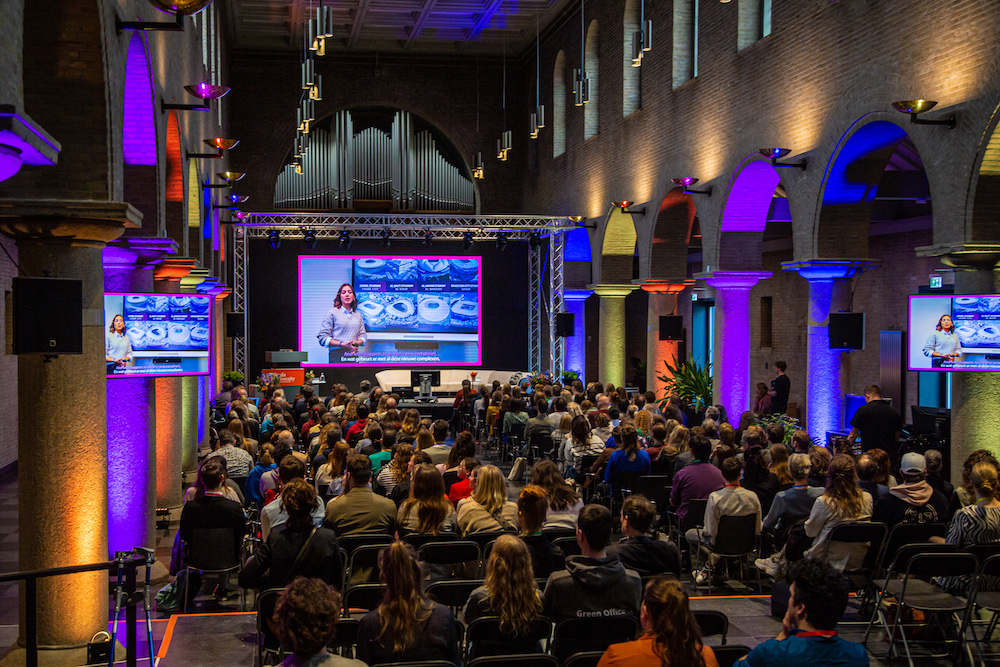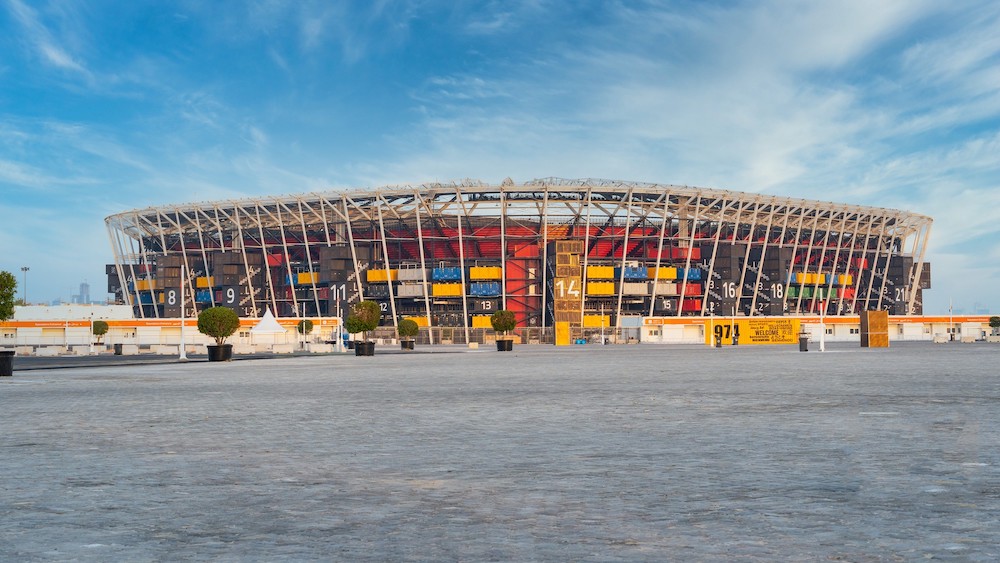Mega Sports Events
A lasting legacy or non-justifiable, sustainable catastrophe?

Qatar 2022 – The biggest sports tournament, the FIFA World Cup took place in a unique setting. It was the first World Cup to be held in winter, the first football event with participating teams from all continents, and the most compact tournament in the history of football. The FIFA World Cup is not only a global celebration of football but also an opportunity for host nations to showcase their capabilities and leave a lasting legacy. In this regard, Qatar, the first Middle Eastern World Cup, has redefined the standards of conducting mega sporting events. Qatar marked its ambition by hosting the most expensive World Cup in history and aiming at setting new benchmarks in sustainability, carbon neutrality, and inclusivity.
Lorena Mahle is a student of Leisure and Event Management in the Social Innovation specialisation and a volunteer at the Football World Cup in Qatar.
Qatar´s ascent to a global player
Over the past few decades, Qatar has transformed from a fishing and pearl diving nation into a global player. Despite being a relatively small country on the Arabian Peninsula, Qatar has made significant strides to position itself as a hub of innovation, investment, cultural exchange, and geopolitical diplomacy. The country´s journey toward becoming a global player can be attributed to its vast reserves of natural gas, which have fuelled Qatar´s economic growth. In addition to economic prosperity, Qatar has actively pursued cultural exchange and diplomacy by investing in research, education, and cultural institutions. The Education City district is home to some of the world´s most renowned international educational institutions, start-up incubators, technology pioneers, and is an attractive destination for foreign businesses.
Besides being an energy provider, geopolitical mediator, and hub of logistics and technology, becoming an irreplaceable actor in the global sports scene is part of the country´s long-term modernisation and branding strategy. Hosting the FIFA World Cup, therefore, is a tool for Qatar to showcase its economic power, reinforce its position in geopolitical diplomacy and blunt the reality of human rights violations and other questionable policies. Other elements of Qatar´s strategy are the ownership of clubs and cooperation with well-known athletes. Qatar took these steps by purchasing the football club Paris St. Germain as well as contracting David Beckham as the country´s sports ambassador (Arbuniès, 2022).
The reconstruction and reutilisation of the stadiums leave an enormous carbon footprint.
The price for transforming the desert into urban landscapes
Qatar has taken advantage of the World Cup to accelerate the country's modernisation . Parts of the total investment of 230 billion dollars were used to finance a world-class transportation system, including the Hamad International Airport, a new metro system, accommodation infrastructure, and urban landscapes (Arbuniès, 2022). Lusail City, the location of the World Cup Final is an example of future placemaking. Designed as a smart and sustainable city, the construction of parks, cycling tracks, walkways, and shopping malls is supposed to serve as a blueprint for future urban development in Qatar. Besides, the country has established itself as an impressive retail destination that caters to both residents and tourists. Malls such as the Mall of Qatar, with their stunning interiors and premium dining, have become representative of Qatar´s ambition to provide a luxurious lifestyle experience. In contrast, the human costs of the World Cup are one of the aspects that has caused heavy international criticism. The preparation and execution of the World Cup created a thousand new jobs. Especially for people coming from India, Nepal, and Bangladesh the working and living conditions in Qatar were a promising chance to escape poverty and unemployment in their home countries. However, the Kafala system, which gave employers the power to take ownership of their workers, contributed to the disastrous working conditions resulting in the death of many workers. According to research conducted by The Guardian, 6,500 workers had died in the country since the host country announcement in 2010. Although the Kafala system has been officially abolished, other rules and legislations still enable the existence of this concept (Amnesty International, 2023).

Qatar´s carbon neutrality strategy
Qatar has made significant strides in creating a fully carbon-neutral event and in promoting sustainability throughout the World Cup. The innovative centrepiece of these efforts is the eight state-of-the-art stadiums. Powered by renewable energy sources, innovative technologies, and waste management, these venues should demonstrate and ensure long-term sustainability. The prospect of neutralising the carbon-dioxide emissions of an event attended by hundreds of thousands of fans accommodated in newly constructed infrastructure in a desert state seems fanciful. In addition to the building of new stadiums, about 1,300 flights landed and departed from Qatar every day. The grass for the eight stadiums and 136 training pitches has partly been imported from North America and the water to maintain the grass condition comes from energy-intensive desalination plants (Boykoff, 2022). Nonetheless, Qatar´s Supreme Committee for Delivery and Legacy has committed to a lasting legacy strategy, ensuring that no ‘white elephants’ are left behind. Some of the stadiums will be used for upcoming sports events, such as the 2024 Asian Football Cup. The Ras Abu Aboud Stadium 974, built from 974 containers, will be dismantled and recycled. Others, such as Lusail Stadium and Al Bayt Stadium will be downsized and converted into community centres with shopping malls, hotels, and educational and medical facilities (Baker, 2022). Even though Qatar attempts to prevent the scenario of abandoned stadiums as has happened in many preceding host countries, the reconstruction and reutilisation of the stadiums leave an enormous carbon footprint.
’A tournament for everyone’
Besides carbon neutrality, Qatar promoted hosting a ’tournament for everyone’ (FIFA, 2022). Aiming at new benchmarks, the world´s biggest football tournament should be the most inclusive and people-focused edition ever being held’. This is despite the country´s laws prosecuting homosexuality and restricting female rights. Qatar made big efforts to foster a welcoming and inclusive atmosphere. All sites not only guaranteed accessibility but also offered innovative facilities and services, such as sensory rooms for people with special needs. Nevertheless, Qatar´s desire to create a World Cup without discrimination failed. Fans and teams supporting the LGBTQ community faced restrictions and refusal when wearing Pride and rainbow accessories. A Qatar World Cup ambassador described ’homosexuality as haram (forbidden) as it is a damage in the mind’ (Whittington, 2022). Even though FIFA and the Qatar government publicly took a stand and re-emphasised their focus on inclusion, these incidents showed their resistance to fully embracing all communities on the largest stage.
Fans and teams supporting the LGBTQ community faced restrictions and refusal when wearing Pride and rainbow accessories.
What´s next?
Qatar´s goal of bringing the country into the world´s focus was undoubtedly successful. The implementation of innovative technologies and practices, coupled with the dedication to setting new standards for mega sports events, represents a significant step in the pursuit of sustainability and modernisation. The country accomplished to showcase its impressive development as a global player while still maintaining the connection to its cultural and traditional roots. Yet, the tournament was tinged with the practice of greenwashing. Ambitions to exceed predecessors and the ever-expanding size of events like this make sustainability claims more aspirational than verifiable. Greenwashing changes the image of mega sports events from carbon disasters into drivers of change that leave lasting imprints on cities, ecosystems, and our shared destiny. Taking Qatar as an example when looking at the upcoming sports events, such as the 2023 Women´s World Cup in Australia and New Zealand and the 2024 Olympic Games in Paris, we should raise the question: ’Are these mega sports events still justifiable in times where we are urged to reduce our carbon footprint to limit the impacts of climate change?’
Sources
- Amnesty International (2023). Reality Check: Migrant Workers Rights in Qatar. Retrieved from https://www.amnesty.org/en/latest/campaigns/2019/02/reality-check-migrant-workers-rights-with-two-years-to-qatar-2022-world-cup/ (04.06.2023).
- Arbuniès, P. (2022). Qatar: Investing in Sports Showcase to Gain Geopolitical Stature. Universidad de Navarra, Global Affairs. Retrieved from https://en.unav.edu/web/global-affairs/qatar-invertir-en-escaparate-deportivo-para-ganar-talla-geopolitica (26.05.2023).
- Baker, A. (2022). Here´s What Will Happen to Qatar´s Billion Dollar Stadiums. Time. Retrieved from https://time.com/6242292/what-happens-to-qatar-world-cup-stadiums/ (04.06.2023).
- Boykoff, J. (2022). The World Cup In Qatar Is a Climate Catastrophe. Scientific American. Retrieved from https://www.scientificamerican.com/article/the-world-cup-in-qatar-is-a-climate-catastrophe/# (30.05.2023).
- FIFA & Supreme Committee for Delivery and Legacy (2022). FIFA World Cup Qatar 2022 Sustainability Strategy. Retrieved from https://www.qatar2022.qa/en/sustainability/social/accessible-qatar (10.06.2023).
- Whittington, G. (2022). FIFA and Qatar Drop the Ball on an Inclusive World Cup. TriplePundit. Retrieved from FIFA and Qatar Drop the Ball on an Inclusive World Cup (triplepundit.com) (04.06.2023).






























































